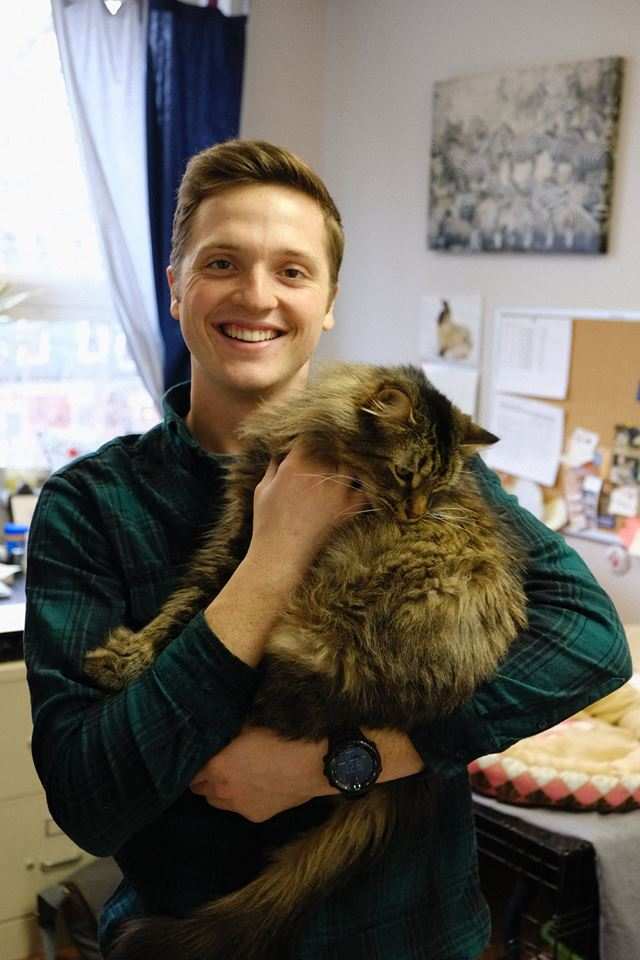Pops wags his tail, itching with excitement to be let out of his kennel. But when he’s free in the play yard behind the Interfaith Hospitality Network of Greater Cincinnati, he doesn’t want to play — Pops wants to snuggle. The 7-year old brindle mixed-breed gives a little wiggle, indicating he wants some butt scratches. Garrett Parsons, IHNGC’s Pet Support Program (PSP) coordinator, obliges.
IHNGC is an organization that provides emergency shelter and services to families and individuals experiencing homelessness. The organization offers hospitality at its center during the day and housing through interfaith communities at night. IHNGC’s team of dedicated social workers and volunteers also helps those in need find and retain affordable housing.
For now, the center is Pops’ temporary home while his owner works to secure pet-friendly housing. Parsons and more than 60 volunteers keep him and their other animal guests happy and healthy during their stay.
IHNGC’s mission is to keep families together, Parsons explains, and if that family includes a pet, they will shelter and care for the animal while their owners get back on their feet. Then, once the individual or family has secured pet-friendly housing, they will reunite them.
“We take families as they are, and if that includes pets, we will take them,” Parsons says. “We are preventing families from suffering. And allowing owners to keep their pets is an important part of trauma reduction.”
Parsons’s role as the program director of PSP goes beyond caring for the some 20 to 40 animals at the space — an assortment of cats, dogs and the occasional exotic pet, like turtles or snakes; it’s about the ethics of social work.
PSP began in 2014 and started out modestly by caring for animals who were staying with families using IHNGC’s services. IHNGC’s executive director Stacey Burge pioneered the program but wanted to expand services. In 2016, she made the decision to bring Parsons on staff. He interned for IHNGC and has a degree in social work from the University of Cincinnati.
Parsons used the foundation Burge built to convert PSP into a full-time shelter. They transformed the basement of IHNGC — which was already equipped as a day center for families — into an area with kennels for dogs, a cat room and pet supply storage with the support of PetSmart Charities. IHNGC also adapted part of the parking lot for use as an outdoor play area for dogs.
However, the shelter is only meant to be temporary; most of the animals stay for three months and then are reunited with their families.
Over the past year, PSP has doubled the number of pets they are sheltering, Parsons says. He has worked to enact a foster program where he places pets in temporary homes to meet the demand. And in October 2019, PetSmart Charities again awarded IHNGC with a much-needed grant to expand their shelter. PSP hopes to go from caring for 110 pets per year to 250.
Their approach to caring for families and their pets is something found at only a few nearby organizations. For example, Columbus’ Choices for Victims of Domestic Violence installed kennels for cats, dogs and other critters this past August; the national Pets of The Homeless focuses on feeding and providing veterinary care to animals whose owners are homeless; and the local Pets in Need is a nonprofit veterinary clinic. However, to Parsons’s knowledge, PSP is the first temporary pet shelter in the Cincinnati area.
And the model is different. PSP temporarily shelters animals to help owners facing homelessness for any reason and also assigns owners a case worker to help them find pet-friendly housing.
Parsons says many people might think that income determines whether or not people are pet owners, but research proves that is not the case. According to a survey conducted by the American Pet Products Association from 2019-2020, 67 percent, or 85 million American households, own pets. Parsons estimates people experiencing homelessness have pets at the same rates as the rest of the American population.
“It is about redefining what it means to be a pet owner,” he says.
The bond between humans and animals runs deep, which is why income is not a reliable way to judge who is likely to have a pet. “A lot of people will feed their animal before feeding themselves,” Parsons says.
Oftentimes pet owners who utilize PSP are couch surfing or temporarily staying in a shelter. Most of the pet owners in the program had stable jobs and a home. However, some sort of circumstance, usually the loss of employment, caused them to become homeless, Parsons says.
“When people think of homelessness, they think of people panhandling on the street,” he says. “That is just a portion of people experiencing homelessness.”
Those are the circumstances Marine veteran James M. Cameron experienced last year. Cameron, a self-described jokester from Texas, had several apartments before he found himself at the Volunteers of America (VOA) shelter.
After 20 years of military service, Cameron struggles with a loss of hearing and Post Traumatic Stress Disorder. To help him cope and function, he has two service dogs that he trained himself. Cameron, who is a first-generation American with family heritage from Scotland, comes from a line of dog trainers. He trained attack dogs for the Marine Corps and then rehabilitated retired dogs to be integrated into society.
His service dogs, Raquel, named after Raquel Welch, and Rock, named after Sgt. Rock of D.C. Comics, have been both Cameron’s saving grace for survival and his Achilles heel.
“Raquel, she usually knows when I’m going to have flashbacks before I do,” Cameron says.
Raquel and Rock comfort Cameron through the worst of his symptoms while offering mobility assistance. Because of their breed — American pit bulls — many landlords and shelters will not accept them. Cameron lost two apartments because of altercations with people who tried to harm his dogs or landlords who wouldn’t allow them, despite their service dog status.
“His story is unique,” Parsons says. “While we do not shelter his animals, we want to make sure they have what they need to help them through the transition.”
PSP has helped Cameron fight for Raquel and Rock. Parsons helped get the dogs up to date on their vaccines and an attorney appointed to make sure shelters took them in. Now, Cameron and his service dogs reside in a spacious house with a fenced yard, a small victory for Parsons.
Back at his office in IHNGC, Parsons calls a veterinarian to make an appointment for Rock before turning his attention to applying for grant funding for PSP. Parsons’s salary, veterinary services, pet food, pet toys and everything necessary for running the shelter is funded through grants.
After Parsons finishes the application, he goes and checks on the animals, who are attended to by volunteers every day from 9 a.m. to 5 p.m. Parsons finds Pops missing from his kennel. He looks out the window to find him in the play yard with a volunteer.
“Each situation is different,” he says. “Some of their owners are elderly, some are family pets; it’s important to recognize that there are many different circumstances that surround each of these pets.”
The Interfaith Hospitality Network of Greater Cincinnati is located at 990 Nassau St., Walnut Hills. For more information about them or their Pet Support Program, visit ihncincinnati.org.






